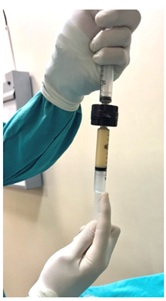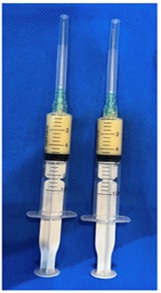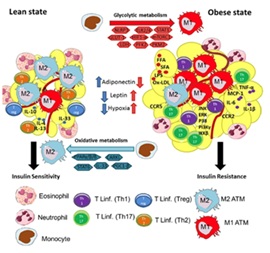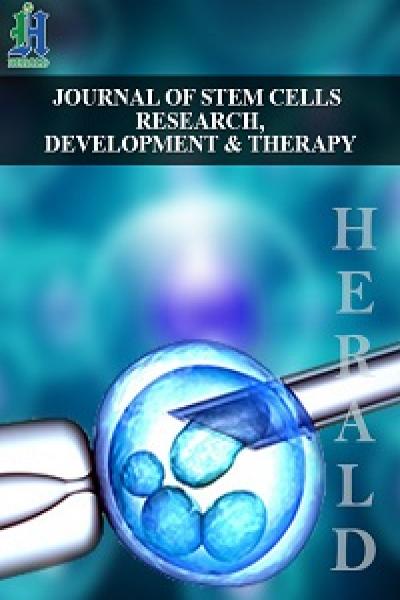
Acute Local Reaction after Intra-Articular Infiltration and Implantation of Microfragmented Autologous-Adipose Tissue (MFAT) - A Case Report
*Corresponding Author(s):
Fernandez Vina MatiasRegeneron Medicina Regenerativa, Argentina
Tel:+54 93364516062,
Email:matiasfernandezvina@hotmail.com ; Matias.FernandezVina@UAI.edu.ar
Abstract
Osteoarthritis (OA) is a pathological condition that results in cartilage degradation and bone damage. A close relationship between cytokine expression and OA has been found.
Adipose Tissue (AT) has become a source of Mesenchymal Stem/Stromal Cells (MSC) for regenerative medicine applications, particularly in musculoskeletal disorders.The MFAT is a potent point of care regenerative therapy as a local treatment by intra-articular injection and implantation of mesenchymal stem cells, with the aim of improving degenerative osteoarthritis of the knee and other musculoskeletal conditions. However, the mechanisms underlying the beneficial effects of MFAT are not yet fully understood.It is not 100% clear what happens in the knees of osteoarthritic patients after intra-articular injection of MFAT. Cells themselves may incorporate into damaged tissue and differentiate into chondrocytes, or MFAT may either activate repair mechanisms through specific pathways that influence repair, inflammation, or both processes of resident chondrocytes through macrophage polarization M0 to M1 and M2.
This is a case report of a patient, who received a microfragmentated autologous adipose tissue that presents an acute local reaction after 6 hours of the procedure.
Introduction
Adipose tissue (AT) has become a source of mesenchymal stem/stromal cells (MSC) for regenerative medicine applications, particularly in musculoskeletal disorders [1].
One of the most innovative techniques in regenerative medicine and cell therapies is autologous adipose tissue microfragmentation (MFAT) in order to achieve trophic and immunomodulatory effects for the biological treatment of articular cartilage, mainly in knee osteoarthritis.
Novel non-enzymatic methods can obtain a fatty tissue derivative highly enriched in pericyte-like elements by mild mechanical forces from human mini-lipoaspirates. Among these methods, the MFAT procedure can provide a ready-to-use adiposetissue-derived product minimally manipulated by mechanical forces in the absence of enzymatic digestion, different than the Stromal Vascular Fraction [SVF]. This MFAT technology processes the lipoaspirates of patients by progressively reducing the size of the groups of adipose tissue through 3 filters with different diameters, allowing the fat to be liquefied, providing an important supply of cells for regenerative purposes [2].
Preliminary data (level IV studies and case series) showed clinically relevant reduction in pain, improvement in knee function, and increase in articular cartilage thickness even after two years of follow-up in various groups of patients [3-6].
However, the mechanisms underlying the beneficial effects of MFAT are not yet fully understood [4,7].
It is not 100% clear what happens in the knees of osteoarthritic patients after intra-articular injection of MFAT. Cells themselves may incorporate into damaged tissue and differentiate into chondrocytes, or MFAT may either activate repair mechanisms through specific pathways that influence repair, inflammation, or both processes of resident chondrocytes through macrophage polarization. M0 to M1 and M2 [7,8].
Clinical Case
This is a 49-year-old man, overweight, with psoriasis, hypertensive grade 2, medicated with valsartan 160 mg and hydrochlorthiazide 25 mg per day, with no other risk factors, and with gonarthrosis grade 2 in both knees for over 3 years.
He was treated one year ago with micronized adipose tissue in the left knee with 95% relief of pain and 85% improvement in quality of life after 3 months, and he came to our Institute of Regenerative Medicine for a second application on the left knee [as therapeutic reinforcement] and a first application on the right knee, after onset of persistent symptoms when practicing physical activity.
In the surgery room and sterile conditions, 40 ml of adipose tissue was extracted from the left posterior flank under tumescent anesthesia, with a 2.5 mm TULIPS fenestrated cannula. Adipose tissu was washed 7 times with physiological solution using a closed system in a 60 ml syringe to remove Klein's solution, lipid oil and cell infra-natant.
Finally, microfragmentation of adipose tissue was performed with the sterile BSL – Adinizer system (Figure 1), obtaining 10 ml of final product (Figure 2) and then applying 3 ml in each joint of both knees by antero-lateral access through anatomical palpation. Figure 1: BSL – Adinizer System.
Figure 1: BSL – Adinizer System.
 Figure 2: Microfragmentated Adipose Tissue.
Figure 2: Microfragmentated Adipose Tissue.
The patient was discharged, without pain, walking from the clinic 45 minutes after the procedure.
At 6 hours, he began to have difficulty walking with progressive pain and heat only in the right knee and slight difficulty in flexing it, making it impossible to reach 100% of the movement. There were no signs of joint effusion, nor redness, but a fever of 39 degrees was associated. The left knee remained pain free and without any difficulty in mobility.
Given the suspicion of an acute local hyper-inflammatory reaction, ice, tramadol drops and antipyretics were indicated to reduce the temperature.
A control ultrasound was performed, where no joint effusion was observed in any of the treated joints.
Laboratories and blood cultures and a Covid-19 test were indicated [turning out to be all normal].
The possibility of septic arthritis was not ruled out, so empirical antibiotic treatment was started with ciprofloxacin 500 mg every 12 hours and clindamycin 300 mg every 8 hours.
The patient evolved at 24 hours, totally asymptomatic, free of pain in both joints, walking, with mobility of the joint and normal temperature values.
Preventive antibiotic treatment was suspended after 5 days and control was performed after 15 days of procedure.
Discussion
Osteoarthritis (OA) is a pathological condition that results in cartilage degradation and bone damage [8]. A close relationship between cytokine expression and OA has been found [9,10]. In fact, it has been shown that interleukin-1 (IL-1) and tumor necrosis factor alpha (TNF-alpha) can induce the production of interleukin-6 (IL-6) and interleukin-8 (IL-8) by part of the synovial cells [11]. Synovial Fluid (SF) has biomechanical, metabolic and regulatory functions. LS is normally a yellowish transparent viscous liquid. An important component of the composition of SF is proteins, such as cytokines and growth factors, which are found in relatively low concentrations in normal SF and are markedly elevated in joint injuries and diseases.
Cytokines can be classified as pro-inflammatory or anti-inflammatory based on their predominant tissue-specific effects. For example, in LS, cytokines such as IL-1α, IL-1β, TNF-α, leukemia inhibitory factor (LIF), IL-6, IL-8, IL-17, and IL-18 have a proinflammatory effectwhile IL-4, IL-10 and IL-13 exert an anti-inflammatory potential. Growth factors found in SF include TGF-β1 and insulin growth factor 1 (IGF-I) and have anabolic effects [1].
Adipose tissue microfragmentation is a relatively new therapy under development in regenerative medicine approved without requiring authorization by the FDA under 361 section, which is used to obtain adipose tissue with intact stromal vascular niches and Mesenchymal Stem Cells [MSCs]. Then it is implanted at the place of interest, in our case the patient's right and left knee. This procedure aims to relieve osteoarthritic pain through the regeneration and paracrine action of MSCs to prepare and maintain angiogenic, antifibrotic, antiapoptotic, antimicrobial and immunomodulatory responses in order to balance the catabolic vs. anabolic response. There is not enough data on the side effects of this procedure; however, the most common include inflammatory synovitis, joint pain and stiffness that resolve within 6 to 24 hours, controlled with ice, acetaminophen, and tramadol.
It is important to note that microfragmented adipose tissue not only contains an intact stromal vascular niche, pericytes, and MSCs, but also contains large amounts of cytokines that can be inflammatory (Figure 3), and even more so in overweight and obese state than lean state patients [12,13].
 Figure 3: Comparison of inflammatory cytokines (MI) in lean state and obese state.
Figure 3: Comparison of inflammatory cytokines (MI) in lean state and obese state.
Our case presented as a case of spontaneous fever and posed a significant diagnostic challenge.
Conclusion
The MFAT is a potent point of careregenerative therapy as a local treatment by intra-articular injection and implantation of mesenchymal stem cells, with the aim of improving degenerative osteoarthritis of the knee and other musculoskeletal conditions.
Currently there is no solid scientific evidence of acute local and febrile reaction due to the application of this type of therapy, which makes it interesting to publish this case report to accompany colleagues reporting on this type of medical situation that has occurred, with a relatively rapid and transitory resolution.
References
- Casari G, Resca E, Giorgin, A, Candini O, Petrachi T, Piccinno MS, et al.(2021) Microfragmented adipose tissue is associated with improved ex vivo performance linked to HOXB7 and b-FGF expression. Stem Cell Res Ther 12: 481.
- Bianchi F, Maioli M, Leonardi E, Olivi E, Pasquinelli G, et al. (2013) A new nonenzymatic method and device to obtain a fat tissue derivative highly enriched in pericyte-like elements by mild mechanical forces from human lipoaspirates. Cell Transplant 22: 2063-2077.
- Striano RD, Chen H, Bilbool N, Azatullah K, Hilado JKH (2015) Non-responsive knee pain with osteoarthritis and concurrent meniscal disease treated with autologous micro-fragmented adipose tissue under continuous ultrasound guidance. CellR4 3: 1690.
- Striano RD, Battista V, Nelko B (2017) Non-responding knee pain with osteoarthritis, meniscus and ligament tears treated with ultrasound guided autologous, micro-fragmented and minimally manipulated adipose tissue. Open J Regener Med 6: 17-26.
- Hudetz D, Boric I, Rod E, Jelec Z, Radic A, et al. (2017) The effect of intra-articular injection of autologous microfragmented fat tissue on proteoglycan synthesis in patients with knee osteoarthritis. Genes 8: 66.
- Cattaneo G, De Caro A, Napoli F, Chiapale D, Trada P, et al. (2018) Micro-fragmented adipose tissue injection associated with arthroscopic procedures in patients with symptomatic knee osteoarthritis. BMC Musculoskelet Disord 19: 176.
- Bosetti M, Borrone A, Follenzi A, Messaggio F, Tremolada C, et al. (2016) Human lipoaspirate as autologous injectable active scaffold for one-step repair of cartilage defects. Cell Transplant 25: 1043-1056.
- Bernardo ME, Fibbe WE (2013) Mesenchymal stromal cells: sensors and switchers of inflammation. Cell Stem Cell 13: 392-402.
- Fernandes JC, Martel-Pelletier J, Pelletier JP (2002) The role of cytokines in osteoarthritis pathophysiology. Biorheology 39: 237-246.
- Stannus O, Jones G, Cicuttini F, Parameswaran V, Quinn S, et al. (2010) Circulating levels of IL-6 and TNF-alpha are associated with knee radiographic osteoarthritis and knee cartilage loss in older adults. Osteoarthr Cartil 18: 1441-1447.
- Hoff P, Buttgereit F, Burmester GR, Jakstadt M, Gaber T, et al. (2013) Osteoarthritis synovial fluid activates pro-inflammatory cytokines in primary human chondrocytes. Int Orthop 37: 145-151.
- Louwen F, Ritter A, Kreis NN, Yuan J (2018) Insight into the development of obesity: functional alterations of adipose-derived mesenchymal stem cells. Obes Rev 19: 888-904.
- Castoldi A, Naffah de Souza C, Câmara NO and Moraes-Vieira PM (2016) The Macrophage Switch in Obesity Development. Front Immunol6: 637.
Citation: Matías FV, Paolo L (2022) Acute Local Reaction after Intra-Articular Infiltration and Implantation of Microfragmented Autologous-Adipose Tissue (MFAT) - A Case Report. J Stem Cell Res Dev Ther 8: 099.
Copyright: © 2022 Fernandez Vina Matias, et al. This is an open-access article distributed under the terms of the Creative Commons Attribution License, which permits unrestricted use, distribution, and reproduction in any medium, provided the original author and source are credited.

